The words that blared out of the audio book player gripped at my heart:
“Why are you teaching a girl child? She will think that she is above her station. All she needs to learn is how to cook, clean, sew and care for children.”
What is Evan listening to? I thought. Then I realized, I should know since I was the one who inserted the cartridge into the book reader. I read the title of the book out loud: “Taking Flight: From War Orphan to Star Ballerina” by Michaela DePrince.
The story caught my attention, but it wasn’t the first time I’d heard that some cultures around the world frown on educating girls. I’ve heard woman after woman describe in TED Talk videos how they acquired their educations at the risk of being thrown in jail, beaten, or even killed.
Such was the case for Michaela. She had been born Mabinty Bangura in Sierra Leone, while a civil war was in full force. She explained in her book that the war began mainly because “the education system had shut down, and without schooling, young people could not get jobs. This resulted in poverty and hunger, which made them desperate, so they formed a revolutionary army to fight for what they needed. As the war progressed, the youth lost track of their goals and started killing innocent villagers.”
The Revolutionary United Front, known as the RUF, was referred to by its victims as “debils,” a combination of “rebels” and “devils.”
Mabinty’s (Michaela’s) father was trying to teach the then 3-year-old to read and write, when her uncle (her father’s brother) chastised him with the above words that stopped me cold while I walked through my living room.
After her father was murdered by the debils at the diamond mine where he worked, she and her mother went to live with her father’s brother where they were beaten and starved. Her mother died from a fever and her uncle sold Mabinty to an orphanage.
That is where she began dreaming of one day traveling to the far-off United States of America. She wrote: “The name of that country had been special to my parents. They had often spoken of someday taking me there. ‘It is a place where education is free – even for girls!’ my papa had said.”
What is it about educating girls that has so many cultures feeling fearful?
Do smart women actually pose a threat to some male political and religious leaders? Does a woman who can think for herself and point out inequalities to those leaders undermine their authority?
March is Women’s History Month – when the contributions of the women of the world are honored. But shouldn’t they be recognized all year long?
You may remember Malala Yousafizi, the Pakistani girl who, in 2012, was shot at point blank range in the head after she refused to stop advocating for girls’ education. She later became the youngest person ever to win the Nobel Peace Prize, and she has since graduated from Oxford University in London.
I was shocked to learn that Malala’s experiences were not unusual.
It happens in India, Afghanistan, Pakistan, Rwanda, Kenya, Nigeria, Iran, Iraq, Liberia and all over the world.
And it happens in the United States, too.
The gender gap in U.S. education is narrowing, but the bias is still there. Girls are encouraged to enter “caregiver” professions like teaching and nursing, while boys are routinely encouraged to study the sciences. Girls have few role models in STEM (Science, Technology, Engineering, Math) professions.
Remember my essay about my great grandmother? Hettie Jones advocated for equal opportunities for women and girls in 1899. Although to a lesser extent, women and girls still face an inequality in their education.
In a May 2018 article on the Brookings Institute’s website, author Joseph Cimpian wrote about when he and a colleague gathered elementary school teachers to discuss the results of one of their surveys.
A teacher questioned why the duo was researching the gender gap in schools. Cimpian writes the teacher said:
“ ‘I don’t even understand why you’re looking at girls’ math achievement. These are my students’ standardized test scores, and there are absolutely no gender differences. See, the girls can do just as well as the boys if they work hard enough.’ Then, without anyone reacting, it was as if a light bulb went on. She gasped and continued, ‘Oh my gosh, I just did exactly what you said teachers are doing,’ which is attributing girls’ success in math to hard work while attributing boys’ success to innate ability.”
Read the biographies of any woman of influence in the U.S. and you’re sure to find tales of discrimination in their education and employment opportunities. Women like Sandra Day O’Connor, Ruth Bader Ginsburg, Jane Goodall, Rosa Parks, Barbara Jordan, Sally Ride, Oprah Winfrey, Michelle Obama, Eleanor Roosevelt and countless others.
Those female pioneers in the United States and the women around the world who refuse to be intimidated have much in common. They are strong, smart, independent, courageous women. I “met” many of them through TEDTalks. These are just a few:
- Safeena Husain, who told of an Indian girl whose name meant “angry” because her father was angry that she was born a girl. And that a goat was considered an asset, while a daughter was thought of as a liability. She said, “Education is freedom work.”
- Kakenya Ntaiya, who described the practice in her Masai village of performing female genital mutilation on girls as they entered puberty. She said many girls bled to death after the operation was performed while other women held them down. The mutilation was supposed to increase the sexual pleasure for the girls’ husbands (Kakenya found out when she was 5 that she was already engaged to be married), while condemning the women to a lifetime of pain. She only agreed to the procedure because her father said she could go to school if she did.
- Ashweetha Shetty, who described how girls in rural India are considered worthless. She is an advocate for those girls and spoke about how education helped her re-write her life.
- Mary Maker, who was a refugee in the Kakuma camp in Sudan. When her mother died, she had four daughters. Other refugees lamented that the woman died without leaving behind any children, because the daughters “didn’t count.” She said an educated girl is feared. Girls are considered property, and the more educated they became, the lower their market value fell.
- Shameem Akhtar dressed like a boy so she could attend school in Pakistan. She said that to learn is to be free, and that words are more powerful than fighting. She believed there would be no world peace if girls were not able to be educated.
- Shabana Basii-Rasikh also dressed like a boy and escorted her older sister to school because she was not allowed in public without a male escort. “We were scared but school was where we wanted to be,” she said, adding that she felt blessed to grow up in a family where education was prized, and daughters were treasured. She delivered her talk when she was 22 years old and said that fewer than 6 percent of Afghan women her age had graduated from high school.
- Sakena Yacoobi was educated in the United States but felt a call to return to her native Afghanistan and open a school for girls. She described facing down Taliban military officers who accused her a running a school. She replied she was just teaching the girls the Qu’ran so they would grow up to be good Muslim wives. To date, more than 15,000 children – girls and the boys conscripted into the Taliban – have been educated in the schools she has built.
According to TheirWorld.org, “Educating girls saves lives and builds stronger families, communities and economies. An educated female population increases a country’s productivity and fuels economic growth. Some countries lose more than $1 billion a year by failing to educate girls to the same level as boys.”
Girls like Michaela DePrince and Malala Yousafizi have experienced horrendous tragedy, but they’ve experienced some great blessings as well. They have prevailed and overcome. Malala to graduate from Oxford and Michaela to become a prima ballerina where dancers of color are few and far between.
I’ve written about Nigerian native Chimamanda Ngozi Adichie before. She has written several books (fiction and non-fiction) including “We Should All Be Feminists.” It’s a short read that packs a huge punch.
She writes that culture does not mold humans, but that humans mold culture, which means we humans need to change the cultures that deny equal rights to women and girls. How do we do that? Tell me what you think should be done in the comments section below or email me directly at susie@stix-n-stonez.com
Until next week,
Susie from Stix-n-Stonez

